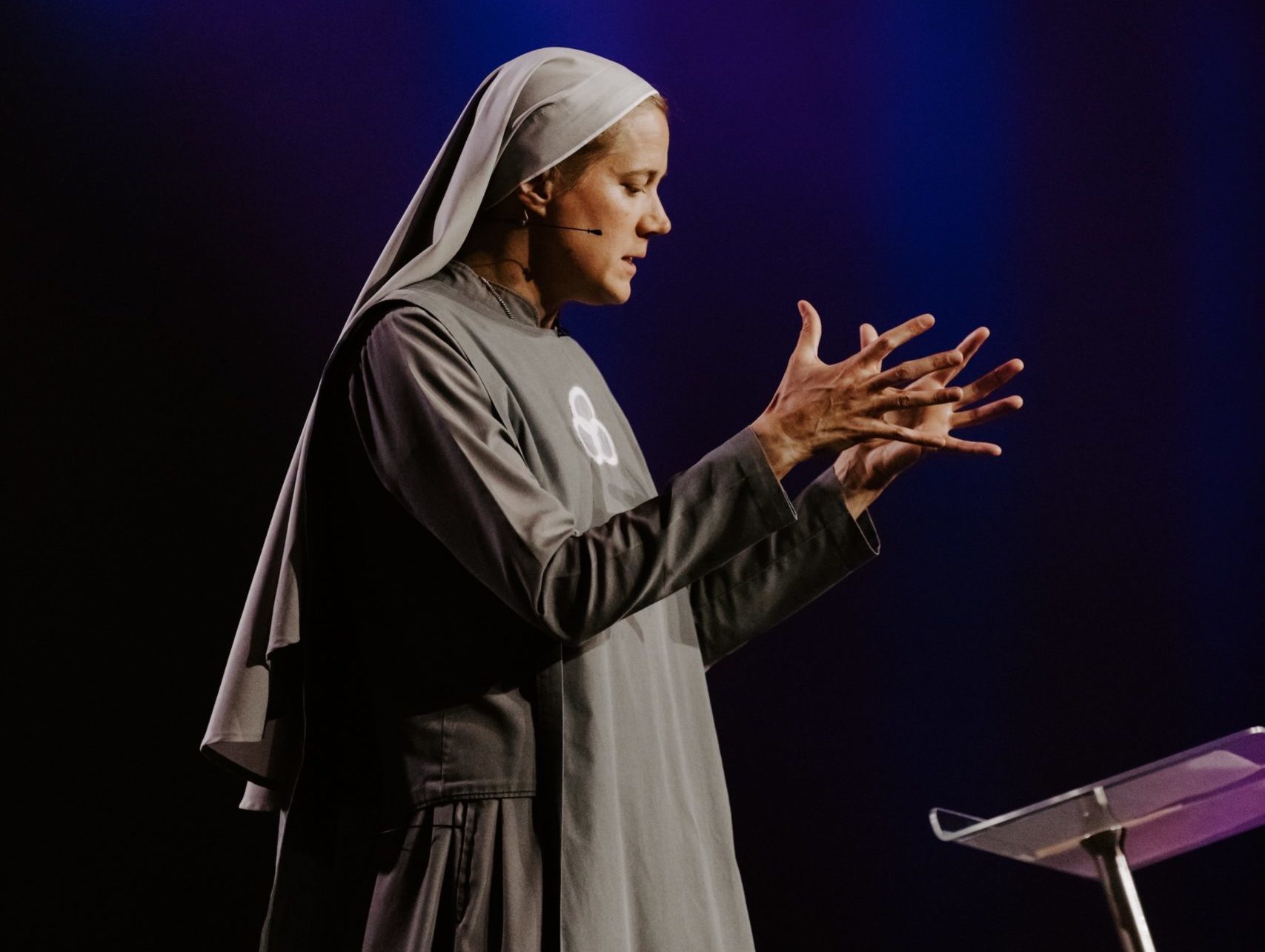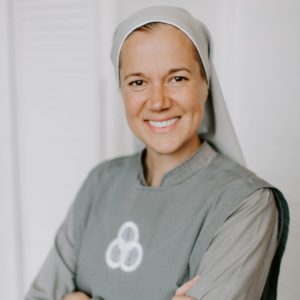
COURTESY AVE MARIA PRESS
News
Need healing this Lent? Try prayer, fasting and almsgiving
March 7, 2022
The Lenten practices of prayer, fasting and almsgiving not only help people orient their lives toward God. They also lead to healing, says Sister Miriam James Heidland.
Her recently released book, “Restore: A Guided Lent Journal for Prayer and Meditation,” helps guide people to God’s healing through daily meditations, questions for reflection, journaling space and prayers.
Sister Miriam James, a member of the Society of Our Lady of the Most Holy Trinity (SOLT), is also the author of the best-selling book “Loved As I Am: An Invitation to Conversion, Healing, and Freedom through Jesus.” She is a popular speaker and retreat leader and co-host of the Catholic women’s podcast “Abiding Together.”
She was a Division I volleyball player at the University of Nevada-Reno before a deep conversion led her into religious life in 1998.
Sister Miriam James has shared her conversion story on EWTN’s “The Journey Home” and “Life On the Rock,” and at numerous SEEK and Steubenville conferences. She recently spoke at last month’s SEEK22 Conference in Knoxville, Tennessee.

COURTESY AVE MARIA PRESS
Sister Miriam James earned a master’s degree in theology from the Augustine Institute in Greenwood Village, Colorado, and is affiliated with the John Paul II Healing Center in Tallahassee, Florida.
She said healing is essential in God’s plan of redemption. She shared some of her insights in a recent telephone interview.
Q: You have a new book out called “Restore: A Guided Lent Journal for Prayer and Meditation.” Could you briefly describe the book and its aim?
The “Restore” book is a gentle invitation into deeper healing. That’s really all
it is. My hope is that when you wake up on Easter Sunday morning, after making this
journey, that you will be different somehow than you were on Ash Wednesday.
The Lenten journey is looked at through the lens of the traditional disciplines of prayer, fasting and almsgiving. The disciplines that we are given by the Church, which we embrace during the season, are actually healing remedies for where we are ruptured. All of us have the original sin of the rupture of the relationship between ourselves and God. From that rupture is every other rupture within ourselves, with each other, with creation.
You know, the word discipline, the root word means “students,” disciples. … So we’re actually in the school of love, where those disciplines of prayer, fasting and almsgiving heal our relationships.
Prayer heals our relationship with God. Fasting heals our relationship with ourselves. And almsgiving heals our relationship with others. So it’s through this lens that we make this Lenten journey with the Lord who heals us.
Q. Your work seems to focus on healing. Why is the mission of healing so important to you?
Pope Benedict (XVI) says in his book, “Jesus of Nazareth,” that healing expresses the entire content of redemption. Because healing is not fixing. It’s actually Jesus bringing us into wholeness and communion. That is the journey of discipleship. That’s the journey of holiness. That’s the journey of the Christian life, that Jesus comes to reconcile everything in the Father. So he is coming to bring every fragmented part of our lives back home, into union with him. That’s the whole journey of the Christian life.
The need for healing is in the heart of every person. Three relationships – our relationship with God, not on his end but ours, our relationship with ourselves and our relationship with others – unfold. So if our relationship with God is broken, it’s going to be very difficult for us to love ourselves and to receive ourselves, which makes it very difficult to be able to give the gift of ourselves to others.
Every exterior war that we see now, every exterior strife, all that, those are just manifestations of interior brokenness. That’s why our journey is not like “When other people get their act together, my life will be better.” It’s “Lord, where are you calling me now to wholeness and communion? Help me to surrender to you. Make me whole.”
Q. In “Restore” you mention four phases of healing using themes traditionally associated with Lent. Could you briefly describe how each phase is a means of healing?
First, the theme of prayer:
Prayer heals our relationship with God. In the book there’s journaling, there’s discussion of reflection questions every day. What it’s inviting you to is not just to “pray more.” It’s inviting you to have deeper intimacy with God, because that’s the whole point of prayer.
Jesus is not interested in what we think he wants to hear. Jesus is interested in what’s actually in our heart. So many times our prayer is kind of shallow or superficial, or we’re afraid to go into certain parts of our heart because we’re afraid God’s mad at us or that he will get mad at us if we admit to certain things. The Lord is none of that. He already knows what’s in our heart, and his desire is to bring that forth. So it’s an invitation to foundational prayer. I have a quote from St. Therese (of Lisieux) in the very beginning of the book that says prayer is a glance toward God, in joy and trial. It’s all things in union with God.
Next, fasting:
Fasting heals our relationship with ourselves. All of us know what St. Paul meant when he says what I want to do, I don’t do. And what I don’t want to do, I do.
In a sense, we say I don’t know what to do.
Fasting orders our loves. If we can’t say no to something, how can we say yes? Fasting is supposed to trigger the deeper aches in our heart. It’s supposed to, in a sense, make us ache, because it allows us to see what’s in our heart.
But it also allows us to let Jesus tend to the deepest places of our heart and to order our loves. It helps us see what we’re using as idols to save ourselves – what we’re turning to, what we’re using to comfort ourselves, what we’re using to run away from our suffering.
Fasting is a great gift that helps order us and integrate us so that we can be in the next stage, to give the gift of ourselves. All this is a lifelong process, but that’s the journey of fasting.
Almsgiving:
Almsgiving heals our relationships with each other. It’s far beyond just giving money, like writing a check and walking away. Almsgiving is a gift of yourself. In the book I talk about being present – physically present and emotionally present – to somebody instead of being distracted or trying to figure out what they’re going to say before they say it. Just being present to somebody – the way Christ is present to us – is a way of almsgiving.
In the book I talk about some of the spiritual works of mercy, like admonishing the sinner or bearing wrongs with patience. I have a whole week on forgiveness. One of the best ways that you can come into deeper healing this Lent is to allow Jesus to unfold the parts of your hearts that hold unforgiveness, to be able to give alms, to give an undeserved gift to somebody else.
What we’re truly doing when we forgive is one of the most profound gifts of healing and restoration in our entire lives. It’s why Jesus puts that part of Our Father at the heart of the prayer: “Forgive us our trespasses as we forgive those who trespass against us.”
Almsgiving is a gift of self to others, and it heals our relationship with others.
Sacrifice:
Sacrifice is actually Holy Week. Holy Week stands alone. It’s the Week of Weeks. It is Jesus’ complete and total gift of self as he lays down his life so that we can live.
So there are reflections (in the book) that week about Judas, about Mary of Bethany, about St. Peter, about his failure and also his reconciling. There’s a meditation on the priesthood. There’s Good Friday, Holy Saturday.
So it is the Week of Weeks, which calls us to set that week to be different and to enter into Christ’s sacrifice for us, which brings us to new life over and over again.
Q. How has God’s healing affected you personally?
It’s profoundly, profoundly changed my life. I know it’s a reason why God keeps inviting me to speak about it to others. I have been on an over 17-year healing journey – a very, very serious journey of healing and recovery and restoring. It’s something that I live out every single day of my life.
I believe in the power of love. I believe in the power of the love Jesus Christ has for us. I believe that there’s nothing in our life that can separate us from the love of God and that no matter what we’re facing in our lives right now, it’s not the end of the story.
Jesus is inviting us into his life. He’s sharing his life with us. He’s inviting us into his Paschal mystery of suffering, death and resurrection every single day. That’s our Christian journey. And that’s in the deepest part of our heart, to be united to Christ forever.
People can begin journaling with “Restore” anytime during Lent or even outside of the season, Sister Miriam James said. The book is available for purchase at https://www.avemariapress.com/products/restore.
People can also watch weekly companion videos for free at the Ave Maria Press YouTube channel at https://www.youtube.com/avemariapress.
Sister Miriam James also is on Twitter at @onegroovynun.